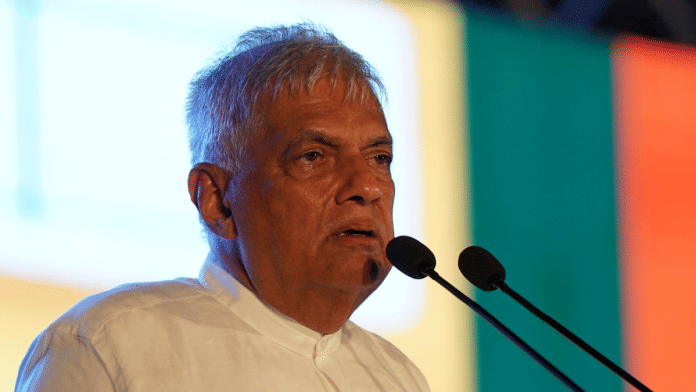New Delhi: In a first in the history of Sri Lanka, former president Ranil Wickremesinghe was arrested Friday by the Criminal Investigation Department (CID) over allegations that he misused public funds during a private trip to London in 2023 while serving as the country’s head of state.
The 76-year-old is the highest-ranking opposition leader to be detained in the ongoing anti-corruption drive launched by the country’s new Leftist administration led by the Janatha Vimukthi Peramuna (JVP) coalition. Later in the day, he was granted bail by a court.
At the center of the investigation is a visit by Wickremesinghe and his wife, Professor Maithree Wickremesinghe, to London on 22–23 September, 2023, to attend a graduation ceremony at the University of Wolverhampton.
The trip was part of a broader overseas itinerary that included official visits to Cuba, where Wickremesinghe participated in the G77 summit, and the US. But police allege the London leg had no official purpose and was effectively a personal detour, paid for with public money.
According to local reports, police submissions to the Colombo Fort Magistrate’s Court, the trip cost the government approximately Rs 16.9 million, including expenses for a 10-person entourage and the former president’s security detail.
Wickremesinghe maintains that his wife paid her own expenses and insists no state funds were misused. His office has dismissed the reports as “false and misleading” and said a formal statement will follow pending legal consultations.
It is pertinent to note that the JVP-led Sri Lankan government earlier in March had reopened the Batalanda torture case in which Wickremsighe was accused of using state force against JVP workers.
Also Read: 7 critical pacts signed during Modi’s visit as India, Sri Lanka give fresh impetus to bilateral ties
What led to the arrest
The United National Party (UNP) leader had assumed the presidency in July 2022, completing the remainder of Gotabaya Rajapaksa’s term after mass protests forced him to resign. Though he lost his re-election bid to Anura Kumara Dissanayake in a closely contested vote last year, Wickremesinghe remained a significant opposition figure, despite his party holding just four seats in the 225-member parliament.
On Friday morning, Wickremesinghe voluntarily arrived at the CID headquarters in Colombo to record a statement. He was taken into custody shortly afterward. Police say his arrest followed new evidence and testimonies from senior officials, including his former presidential secretary Saman Ekanayake and private secretary Sandra Perera, both of whom were questioned last month in connection with the case.
Wickremesinghe’s arrest is unprecedented because though Sri Lanka has seen political scandals and accusations of financial misconduct over the years, senior figures remained untouched by legal consequences, until now. He is now the most senior political figure to be arrested in recent years.
The arrest may mark a shift in the country’s political culture, signaling a more assertive push for transparency and legal accountability, particularly in the wake of the 2022 economic collapse that brought millions to the streets in protest.
It also puts pressure on the current administration, led by President Dissanayake, who was elected in September 2024. Dissanayake campaigned on an anti-corruption platform and is now being closely watched for how his administration handles this case.
The government has overseen the jailing of several prominent opposition politicians, some receiving sentences of up to 25 years for corruption. Multiple members of former president Mahinda Rajapaksa’s family also face prosecution for alleged misuse of public funds, with many currently out on bail awaiting trial.
Earlier this month, the government impeached the police chief Deshabandu Tennakoon over accusations of operating a criminal network with political ties, while the prisons chief was also convicted and jailed for corruption.
Wickremesinghe & Batalanda case
A towering figure in Sri Lankan politics, Wickremesinghe has served as prime minister six times and as president from July 2022 until November 2024. He assumed the presidency in the aftermath of mass protests that toppled then-President Gotabaya Rajapaksa during the country’s worst economic meltdown in decades.
Despite the current charges against him, Wickremesinghe is credited with steering Sri Lanka through its worst economic crisis in 2022. In early 2023, he secured a $2.9 billion bailout from the International Monetary Fund (IMF) and implemented sweeping austerity measures which included sharp tax hikes and the removal of energy subsidies, to boost state revenue and restore fiscal stability. But his tenure was also marked by accusations that he protected the political establishment and cracked down on dissent.
He has long been a polarising figure. His early political career was clouded by his alleged role in the Batalanda torture complex in the late 1980s, when a Presidential Commission of Inquiry, established in 1995, accused Wickremesinghe, who was then a senior cabinet minister, of having knowledge of, and alleged administrative responsibility for, the Batalanda scheme.
The site was reportedly used as a covert detention and torture facility targeting members of the JVP during the late 1980s insurgency. Although the Commission did not result in criminal charges, it recommended that Wickremesinghe be stripped of his civic rights. The recommendation, however, was never acted upon. The controversy resurfaced earlier this year after a widely criticised interview he gave to Al Jazeera.
During the interview, Wickremesinghe, who then served as Minister of Industries under President Ranasinghe Premadasa in the late 1980s, was questioned about allegations of torture during that period. He denied any involvement in or responsibility for the alleged abuses, despite being accused of enabling operations at what became known as a “torture camp.”
Post the interview, Wickremesinghe accused members of the interview panel of having ties to the Liberation Tigers of Tamil Eelam (LTTE), and claiming the interview was unfairly edited.
“This interview is unlike ours,” Wickremesinghe complained, adding that the interview had been edited and that “some of the juicier ones have not come today, and I don’t think it will come again.”
(Edited by Tony Rai)






